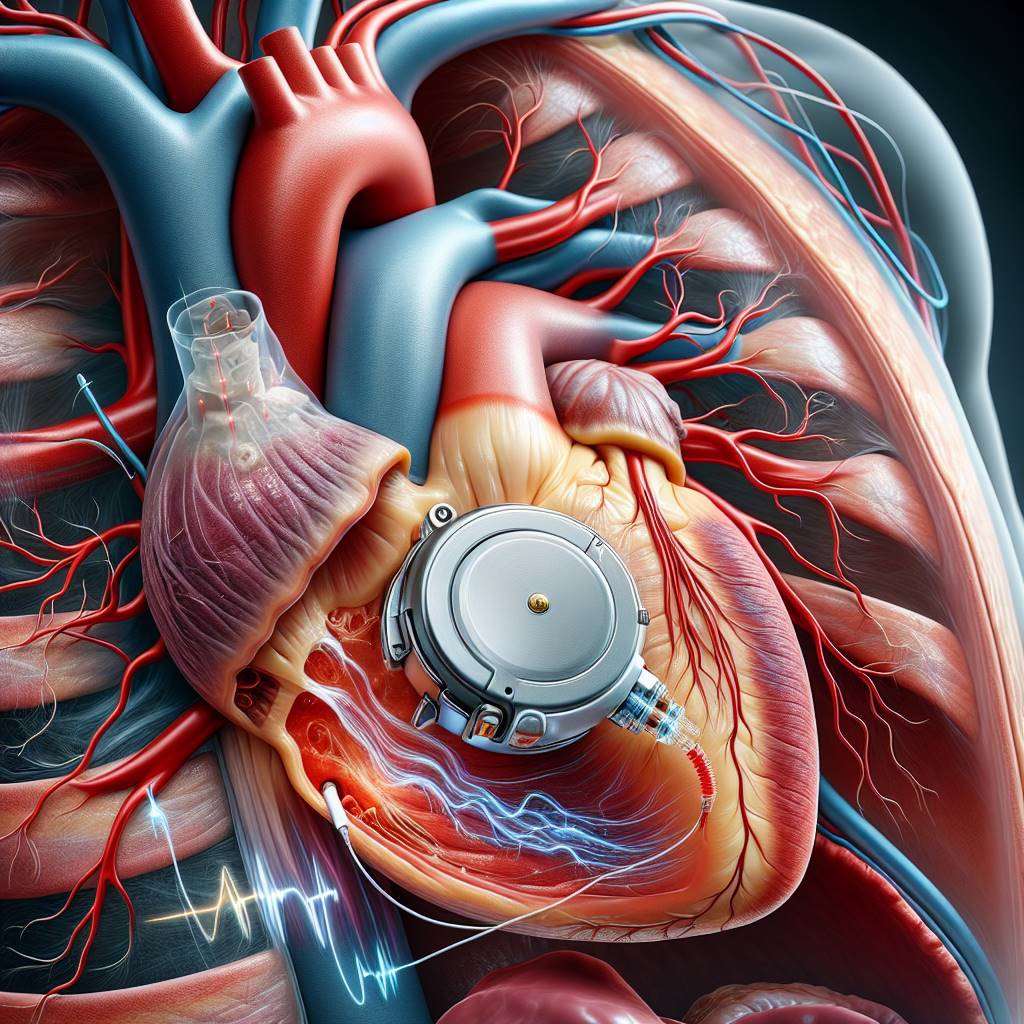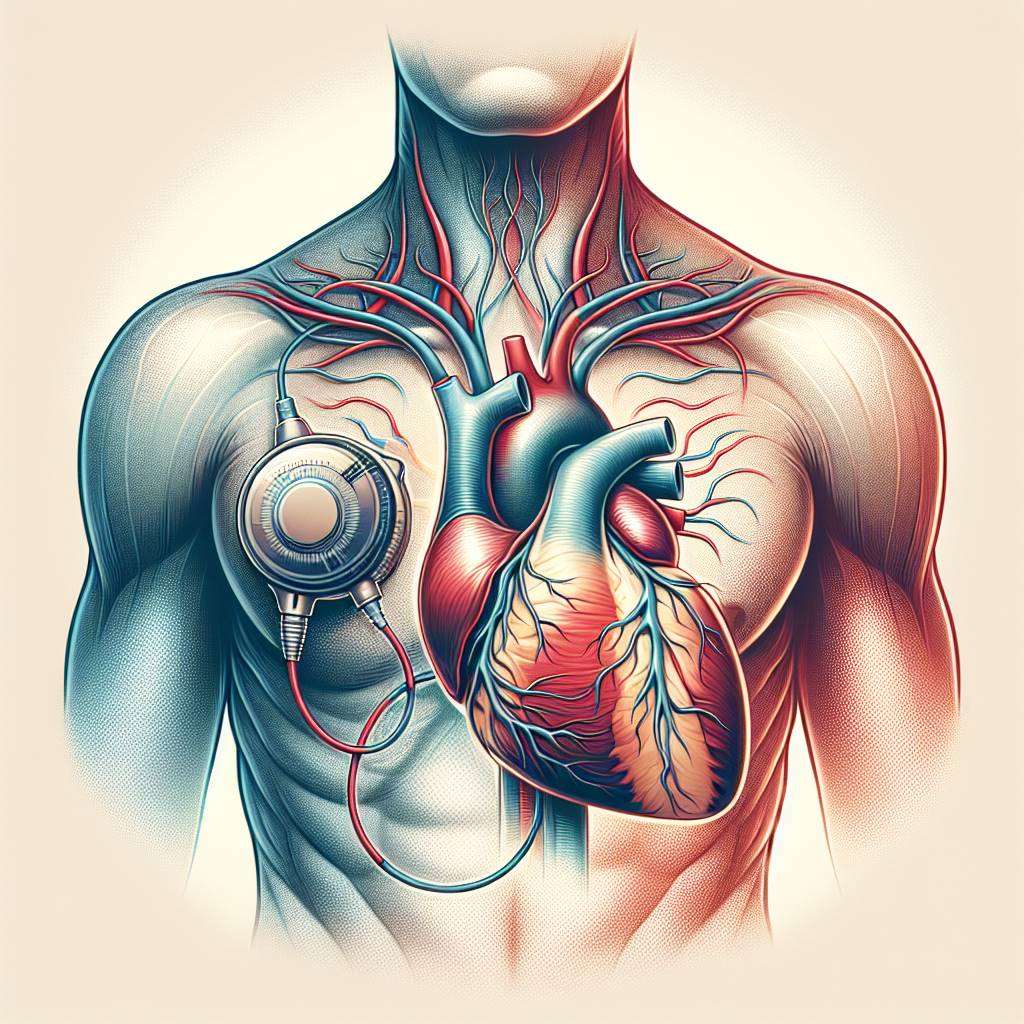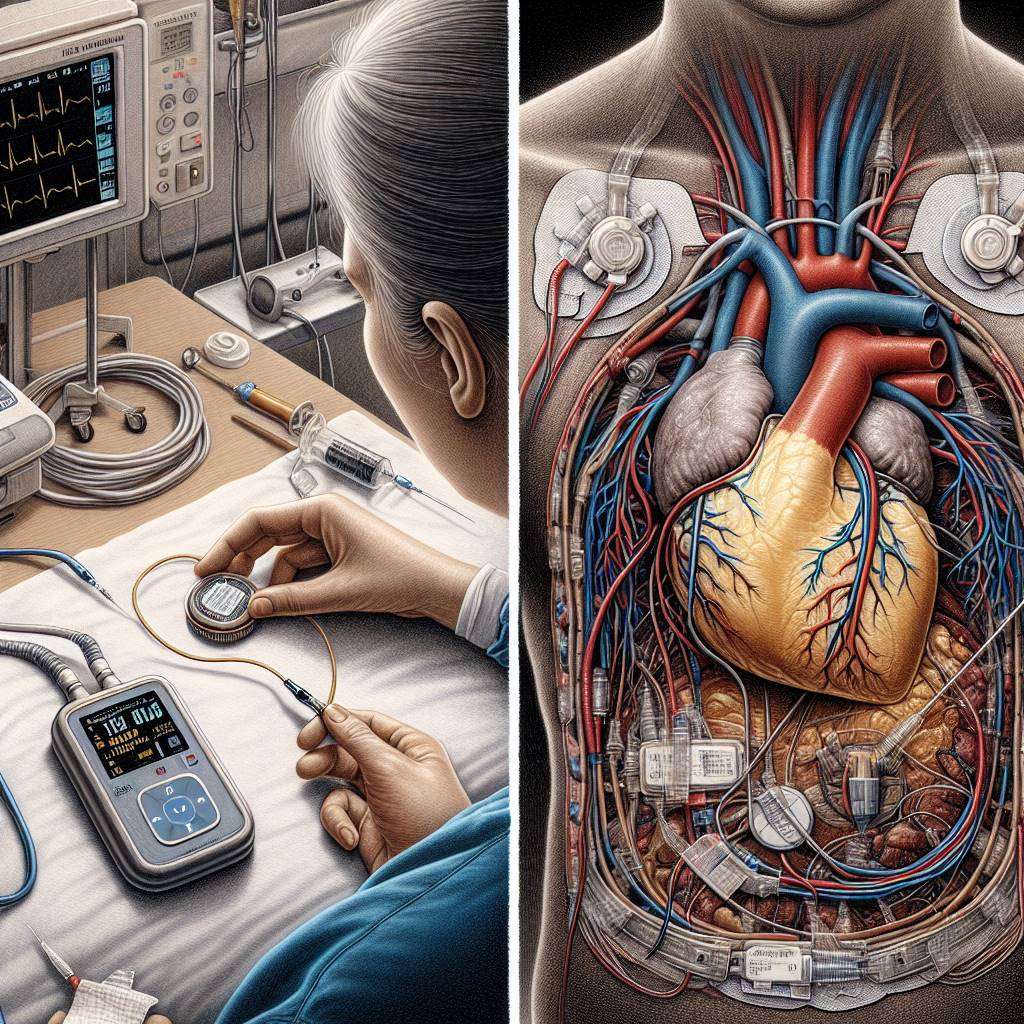A pacemaker is a small medical device implanted in the chest to regulate abnormal heart rhythms. It is crucial for individuals with arrhythmias, where the heart beats too fast, too slow, or irregularly. Understanding who needs a pacemaker can help patients and families make informed decisions about managing heart health effectively.
Medical disclaimer: This content is for general awareness and does not replace a doctor’s consultation. For diagnosis or treatment decisions, consult a qualified specialist.
Pacemakers are life-saving devices for people with specific heart conditions. They improve quality of life, prevent complications, and reduce risks associated with untreated arrhythmias. This article explores the conditions, symptoms, and age groups that may require a pacemaker, offering insights into its importance for both younger and older patients.
What Is a Pacemaker and How Does It Work?
A pacemaker is a small, battery-operated device implanted under the skin near the chest. It sends electrical impulses to the heart to maintain a normal rhythm. This device is essential for individuals whose hearts cannot regulate their beats naturally due to conditions like bradycardia (slow heart rate) or heart block.
The pacemaker consists of two main parts: the pulse generator, which produces electrical signals, and leads (wires) that deliver these signals to the heart. Modern pacemakers are highly advanced, with features like rate responsiveness, which adjusts the heart rate based on physical activity. This ensures that the heart functions efficiently during rest and exertion.
Pacemakers are typically implanted through a minor surgical procedure, and patients can resume normal activities within a few weeks. They are a reliable solution for managing chronic heart rhythm disorders and improving overall cardiac health.

Signs You May Need a Pacemaker Implant
Recognizing the symptoms of heart rhythm issues is crucial for determining if a pacemaker implant is necessary. Common signs include persistent fatigue, dizziness, fainting spells, and shortness of breath. These symptoms often indicate that the heart is not pumping blood effectively due to an irregular rhythm.
Other warning signs include chest pain, confusion, or difficulty exercising. In severe cases, individuals may experience sudden cardiac arrest. If you notice these symptoms, consult a cardiologist immediately for a thorough evaluation. Early diagnosis can prevent complications and improve outcomes.
- Unexplained fainting or dizziness
- Slow or irregular heartbeat
- Shortness of breath during mild activities
- Fatigue that does not improve with rest
A pacemaker can restore normal heart function, alleviate symptoms, and enhance quality of life for those with arrhythmias or other heart rhythm disorders.
Heart Conditions That Require a Pacemaker Device
Several heart conditions may necessitate the use of a pacemaker. One of the most common is bradycardia, where the heart beats too slowly to supply adequate blood to the body. Another condition is heart block, which occurs when electrical signals are delayed or blocked as they travel through the heart.
Other conditions include sick sinus syndrome, where the heart's natural pacemaker malfunctions, and atrial fibrillation with a slow ventricular response. In some cases, pacemakers are also used after heart surgery or in patients with heart failure to improve coordination between the heart's chambers.
These devices are tailored to the individual's needs, ensuring optimal management of their specific condition. Consulting a cardiologist is essential to determine if a pacemaker is the right solution for your heart health.
Can Young People Also Need a Pacemaker?
While pacemakers are more commonly associated with older adults, younger individuals may also require them. Certain congenital heart defects or inherited conditions, such as Long QT syndrome or Brugada syndrome, can disrupt normal heart rhythms and necessitate a pacemaker.
Athletes with arrhythmias or those who experience fainting during physical activity may also benefit from a pacemaker. Additionally, some young people develop heart rhythm issues due to infections, medications, or other health conditions.
Early diagnosis and treatment are critical for younger patients to maintain an active and healthy lifestyle. A pacemaker can provide the necessary support to ensure their heart functions properly, allowing them to lead a normal life.
Understanding Pacemakers for Older Adults
Older adults are the most common recipients of pacemaker implants. Age-related changes in the heart, such as bradycardia or heart block, often necessitate the use of this device. A pacemaker can significantly improve their quality of life by alleviating symptoms like fatigue, dizziness, and fainting.
For seniors, the decision to implant a pacemaker depends on their overall health, lifestyle, and specific heart condition. The procedure is minimally invasive, and recovery is typically quick, making it a viable option for most older patients.
| Benefits |
Considerations |
| Improved heart function |
Requires regular check-ups |
| Reduced symptoms like fatigue |
Potential for minor surgical risks |
| Enhanced quality of life |
Battery replacement every 5–15 years |
With proper care and regular follow-ups, pacemakers can help older adults live healthier, more active lives despite their heart conditions.
How Pacemakers Help Manage Arrhythmias Effectively
A pacemaker is a small medical device implanted in the chest to help regulate abnormal heart rhythms, also known as arrhythmias. Arrhythmias occur when the heart beats too fast, too slow, or irregularly, which can lead to symptoms like fatigue, dizziness, or even fainting.
The pacemaker sends electrical impulses to the heart to ensure it beats at a normal rate. This is particularly beneficial for individuals with conditions like bradycardia (slow heart rate) or heart block, where the heart's natural electrical system is impaired. Modern pacemakers are highly advanced, with features like rate responsiveness, which adjusts the heart rate based on physical activity.
By restoring a steady heartbeat, pacemakers improve blood flow, reduce symptoms, and enhance overall quality of life for patients with arrhythmias.

Bradycardia: A Common Reason for Pacemaker Use
Bradycardia, or a slow heart rate, is one of the most common conditions requiring a pacemaker. In a healthy individual, the heart typically beats between 60 and 100 times per minute. However, in bradycardia, the heart rate drops below 60 beats per minute, which can lead to insufficient blood flow to the body.
Symptoms of bradycardia include fatigue, shortness of breath, dizziness, and fainting. These symptoms can significantly impact daily life and may even pose serious health risks if left untreated. A pacemaker helps by sending electrical signals to the heart, ensuring it beats at a normal pace.
- Improves blood circulation
- Reduces symptoms like fatigue and dizziness
- Prevents complications such as heart failure
For individuals with bradycardia, a pacemaker can be a life-changing solution, restoring energy levels and improving overall well-being.
Heart Block and the Role of Pacemakers in Treatment
Heart block is a condition where the electrical signals that control the heartbeat are partially or completely blocked. This can result in an irregular or slow heart rate, leading to symptoms like chest pain, fainting, and fatigue. Heart block is classified into three types: first-degree, second-degree, and third-degree, with third-degree being the most severe.
A pacemaker is often recommended for second- and third-degree heart block. The device bypasses the blocked signals by sending electrical impulses directly to the heart muscles, ensuring a steady and reliable heartbeat. This prevents complications such as heart failure or sudden cardiac arrest.
By addressing the underlying electrical issue, pacemakers play a crucial role in managing heart block and improving the patient's quality of life.
What Age Groups Commonly Require Pacemaker Surgery?
Pacemaker surgery is most commonly associated with older adults, as the risk of heart rhythm disorders increases with age. Conditions like bradycardia and atrial fibrillation are more prevalent in individuals over the age of 60, making them the primary candidates for pacemakers.
However, pacemakers are not limited to the elderly. Younger individuals, including children, may require pacemakers due to congenital heart defects or inherited arrhythmias. In such cases, the device helps maintain a normal heart rhythm and supports healthy growth and development.
| Age Group |
Common Conditions |
| Children |
Congenital heart defects |
| Adults (30–60 years) |
Inherited arrhythmias |
| Seniors (60+ years) |
Bradycardia, atrial fibrillation |
Regardless of age, pacemakers are tailored to meet the specific needs of the patient, ensuring effective treatment and improved heart health.
Do Athletes or Active Individuals Need Pacemakers?
While athletes are typically associated with strong heart health, some may require a pacemaker due to specific conditions like bradycardia or heart block. Intense physical training can sometimes lead to changes in the heart's electrical system, resulting in an abnormally slow heart rate.
For active individuals, modern pacemakers come with advanced features such as rate responsiveness. This allows the device to adjust the heart rate based on activity levels, ensuring optimal performance during exercise or daily activities. Pacemakers are designed to support an active lifestyle without restricting physical capabilities.
With proper medical guidance and regular follow-ups, athletes with pacemakers can continue to lead active, healthy lives while managing their heart condition effectively.
Temporary vs Permanent Pacemakers: Key Differences
Pacemakers are devices designed to regulate abnormal heart rhythms. They are broadly classified into temporary and permanent pacemakers. Temporary pacemakers are used for short-term conditions, such as during recovery from surgery or after a heart attack.
In contrast, permanent pacemakers are implanted for long-term management of chronic conditions like bradycardia or heart block. Temporary pacemakers are external and require close monitoring, while permanent ones are surgically implanted under the skin. The choice depends on the patient's condition and the duration of treatment required.

How Pacemakers Improve Quality of Life for Patients
Pacemakers significantly enhance the quality of life for individuals with arrhythmias or other heart rhythm disorders. By maintaining a steady heart rate, they help reduce symptoms like fatigue, dizziness, and fainting episodes.
Patients with pacemakers often experience improved energy levels, enabling them to engage in daily activities without fear of sudden heart-related complications. Additionally, pacemakers can prevent life-threatening conditions such as cardiac arrest in high-risk patients.
For elderly patients or those with chronic heart conditions, pacemakers provide a sense of security and independence. Regular follow-ups with a cardiologist ensure the device functions optimally, further improving the patient's overall well-being.
When Should You Consult a Doctor About Pacemakers?
It is crucial to consult a doctor if you experience symptoms like persistent fatigue, dizziness, or episodes of fainting. These could indicate underlying heart rhythm issues such as bradycardia or atrial fibrillation.
Other warning signs include shortness of breath, chest pain, or an irregular heartbeat. If you have a history of heart disease or have undergone heart surgery, regular check-ups are essential to monitor your heart's health. Early diagnosis can prevent complications and determine if a pacemaker is necessary.
- Unexplained fainting spells
- Slow or irregular heartbeats
- Difficulty performing physical activities
Timely consultation with a cardiologist can help identify the need for a pacemaker and ensure appropriate treatment.
Risks of Delaying Pacemaker Implantation for Heart Issues
Delaying pacemaker implantation can lead to severe complications, especially for individuals with chronic heart conditions. Without a pacemaker, symptoms like bradycardia or heart block can worsen, increasing the risk of fainting or sudden cardiac arrest.
In some cases, untreated heart rhythm disorders may cause irreversible damage to the heart muscle, leading to heart failure. Delays can also result in reduced blood flow to vital organs, causing fatigue, confusion, or organ dysfunction.
Timely implantation of a pacemaker not only prevents these risks but also improves the patient's overall prognosis. If you or a loved one has been advised to get a pacemaker, it is essential to act promptly to avoid life-threatening complications.
Latest Advances in Pacemaker Technology and Benefits
Modern pacemakers have evolved significantly, offering advanced features to improve patient outcomes. Leadless pacemakers, for instance, are smaller and do not require wires, reducing the risk of infections and complications.
Other innovations include dual-chamber pacemakers that synchronize the heart's upper and lower chambers, ensuring optimal blood flow. Remote monitoring technology allows doctors to track the device's performance and the patient's heart health in real-time.
| Feature |
Benefit |
| Leadless Design |
Minimizes infection risk |
| Remote Monitoring |
Convenient follow-ups |
| Extended Battery Life |
Fewer replacements needed |
These advancements make pacemakers safer, more efficient, and better suited to individual patient needs.
Best Pacemaker Surgery Doctors in India
Dr. Balbir Singh, Chairman of Cardiology at Max Super Speciality Hospital, Saket, is a renowned cardiologist with over 30 years of experience. He specializes in electrophysiology and pacemaker implantation. Another expert is Dr. Praveen Chandra, Chairman of Interventional Cardiology at Medanta - The Medicity, Gurugram, with 25+ years of experience and international recognition in cardiac care.
Learn more on best pacemaker implantation surgery doctors in india
Best Pacemaker Surgery Hospitals in India
Fortis Escorts Heart Institute, Delhi, a NABH-accredited hospital, is renowned for advanced cardiac care, including pacemaker implantation. Apollo Hospitals, Chennai, a JCI-accredited facility, offers cutting-edge technology and multidisciplinary cardiac care. Both hospitals provide international patient services and have a history of successful outcomes in complex cardiac procedures.
Find more best pacemaker implantation surgery hospitals in india
Pacemaker Surgery Cost in India
The cost of pacemaker implantation in India typically ranges from INR 2,00,000 to INR 5,00,000 (approximately USD 2,500 to USD 6,000). Factors influencing the cost include the type of pacemaker, hospital category, and doctor’s expertise. The average hospital stay is 2-3 days. India offers a significant cost advantage compared to Western countries, with options for medical insurance and third-party financing.
Learn pacemaker implantation surgery cost in india
Pacemaker Surgery Treatment in India
Pacemaker implantation in India involves placing the device under the skin near the chest, with leads connected to the heart. The procedure is performed under local anesthesia and guided by advanced imaging techniques. Recovery typically takes 1-2 weeks. Top hospitals use innovations like leadless pacemakers and adhere to global medical protocols, ensuring high success rates.
Learn on Pacemaker Surgery Treatment in India
FAQs
1. What is a pacemaker?
A pacemaker is a small medical device implanted in the chest to regulate abnormal heart rhythms by sending electrical impulses to the heart.
2. Who needs a pacemaker?
Patients with bradycardia (slow heart rate), heart block, or certain types of arrhythmias may require a pacemaker to maintain a normal heart rhythm.
3. Is pacemaker implantation a major surgery?
No, pacemaker implantation is a minimally invasive procedure performed under local anesthesia, typically requiring a short hospital stay.
4. How long does a pacemaker last?
A pacemaker battery usually lasts between 5 to 15 years, depending on the type and usage. Regular follow-ups are essential to monitor its function.
5. Can I lead a normal life with a pacemaker?
Yes, most patients can resume normal activities after recovery. However, precautions like avoiding strong electromagnetic fields are necessary.
6. Are there risks associated with pacemaker implantation?
Risks are minimal but may include infection, bleeding, or lead displacement. Choosing an experienced cardiologist reduces these risks.
7. How soon can I return to work after pacemaker surgery?
Most patients can return to work within 1-2 weeks, depending on their recovery and the nature of their job.
8. Can a pacemaker be removed or replaced?
Yes, pacemakers can be replaced when the battery depletes or if there are complications. Removal is rare and done only when necessary.
9. Are pacemakers MRI-compatible?
Modern MRI-conditional pacemakers are designed to be safe during MRI scans. Consult your doctor to confirm compatibility.
10. How often should I follow up after pacemaker implantation?
Regular follow-ups every 6-12 months are recommended to ensure the pacemaker is functioning optimally.
Understanding Pacemakers: Essential Insights for Patients
For individuals facing heart rhythm issues, the prospect of a pacemaker implantation can be daunting. It's crucial to know what to expect during this procedure to ease any concerns. Our detailed guide on what to expect during pacemaker implantation provides a step-by-step overview, ensuring you are well-prepared for the journey ahead.
Moreover, understanding the differences between a pacemaker and a defibrillator is vital for informed decision-making. While both devices play significant roles in managing heart conditions, they serve different purposes. To learn more about these distinctions, check out our article on pacemaker vs. defibrillator (ICD), which clearly outlines their key differences.
By educating yourself on these topics, you can approach your treatment with confidence and clarity, ensuring a better understanding of your heart health management.